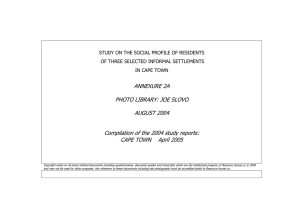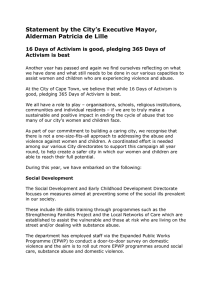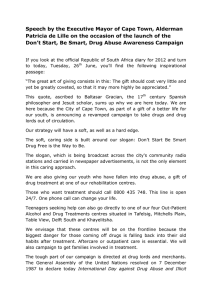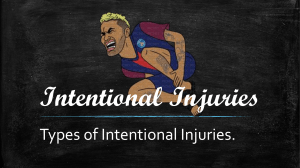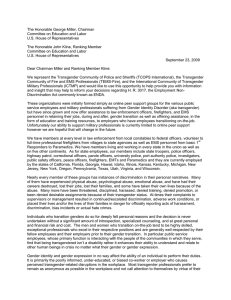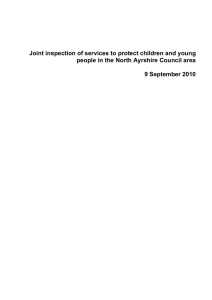SPEECH BY HELEN ZILLE MAYOR OF CAPE TOWN
advertisement
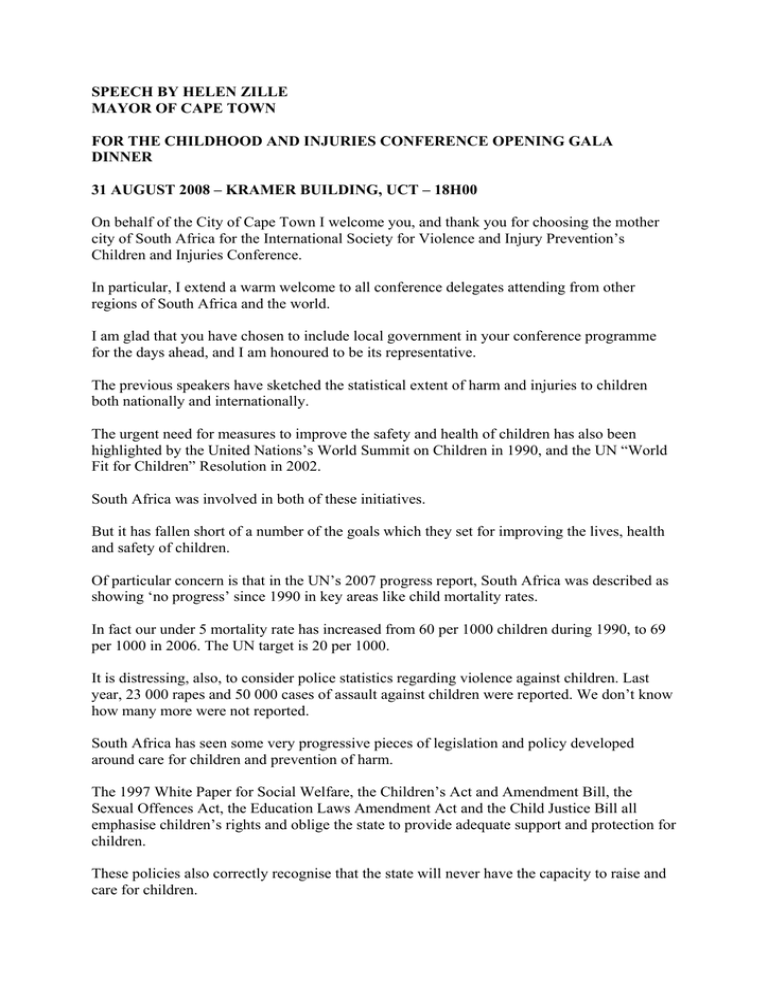
SPEECH BY HELEN ZILLE MAYOR OF CAPE TOWN FOR THE CHILDHOOD AND INJURIES CONFERENCE OPENING GALA DINNER 31 AUGUST 2008 – KRAMER BUILDING, UCT – 18H00 On behalf of the City of Cape Town I welcome you, and thank you for choosing the mother city of South Africa for the International Society for Violence and Injury Prevention’s Children and Injuries Conference. In particular, I extend a warm welcome to all conference delegates attending from other regions of South Africa and the world. I am glad that you have chosen to include local government in your conference programme for the days ahead, and I am honoured to be its representative. The previous speakers have sketched the statistical extent of harm and injuries to children both nationally and internationally. The urgent need for measures to improve the safety and health of children has also been highlighted by the United Nations’s World Summit on Children in 1990, and the UN “World Fit for Children” Resolution in 2002. South Africa was involved in both of these initiatives. But it has fallen short of a number of the goals which they set for improving the lives, health and safety of children. Of particular concern is that in the UN’s 2007 progress report, South Africa was described as showing ‘no progress’ since 1990 in key areas like child mortality rates. In fact our under 5 mortality rate has increased from 60 per 1000 children during 1990, to 69 per 1000 in 2006. The UN target is 20 per 1000. It is distressing, also, to consider police statistics regarding violence against children. Last year, 23 000 rapes and 50 000 cases of assault against children were reported. We don’t know how many more were not reported. South Africa has seen some very progressive pieces of legislation and policy developed around care for children and prevention of harm. The 1997 White Paper for Social Welfare, the Children’s Act and Amendment Bill, the Sexual Offences Act, the Education Laws Amendment Act and the Child Justice Bill all emphasise children’s rights and oblige the state to provide adequate support and protection for children. These policies also correctly recognise that the state will never have the capacity to raise and care for children. They stress the need to empower parents, and they correctly focus on the importance of the family unit. Yet, in contrast to these insights and intentions, the reality is quite different. Poverty and unemployment have put tremendous pressure on government. The decision has been taken to provide a R2000 per month grant to the caregivers of over 8 million children, and more recently government introduced a R6000 per month grant for foster caregivers. These grants are often abused, or even become incentives for young people to have children. In many cases, because they are provided without adequate monitoring or social support, they create a culture of dependency instead of helping parents to become self-sufficient. And they do not address the threat to the safety and wellbeing of children posed by emotional and physical abuse, alcoholism, and neglect. It is clear that we need greater capacity for social support and counselling, for both parents and children. The state has not been able to address this so far. In 2005 the Department of Social Development and non-profit organisations employed a total of 5000 social workers in South Africa. Yet research and international best practice suggests that we need at least 16 500 social workers to meet current demand, and ideally we should have 65 000. This is largely due to skills shortages and the skills exodus from South Africa. Coupled with the shortage of social workers, efforts to shield children from abuse have also been hampered by the closure of the Child Protection Units, where trained officers specifically dealt with cases of child abuse. Many of these officers were deployed to ordinary police stations. But where this has happened, research has shown that these specially-trained officers are not given the resources to deal adequately with cases of child abuse. They are also restricted to working only in those areas where they are based, leaving vast areas with no coverage by CPU-trained personnel whatsoever. At a local government level the City of Cape Town cannot intervene in these policy areas. We have a very limited but important Constitutional mandate to support early childhood development. We support crèches, care facilities for children orphaned by HIV/AIDS, and initiatives to reduce drug and alcohol abuse. But the UN’s finding that over 98% of all child deaths from injury occur in developing countries indicates that the best way to make this a safer city – and a safer country – for children is to address basic economic and developmental challenges. I will discuss this topic in some detail when I see you again on Wednesday. For now, I would like to wish you well for the days ahead, and for the work you intend to do on guidelines for violence and injury prevention. I trust this will mark the beginning of a much bigger process. I thank you.



